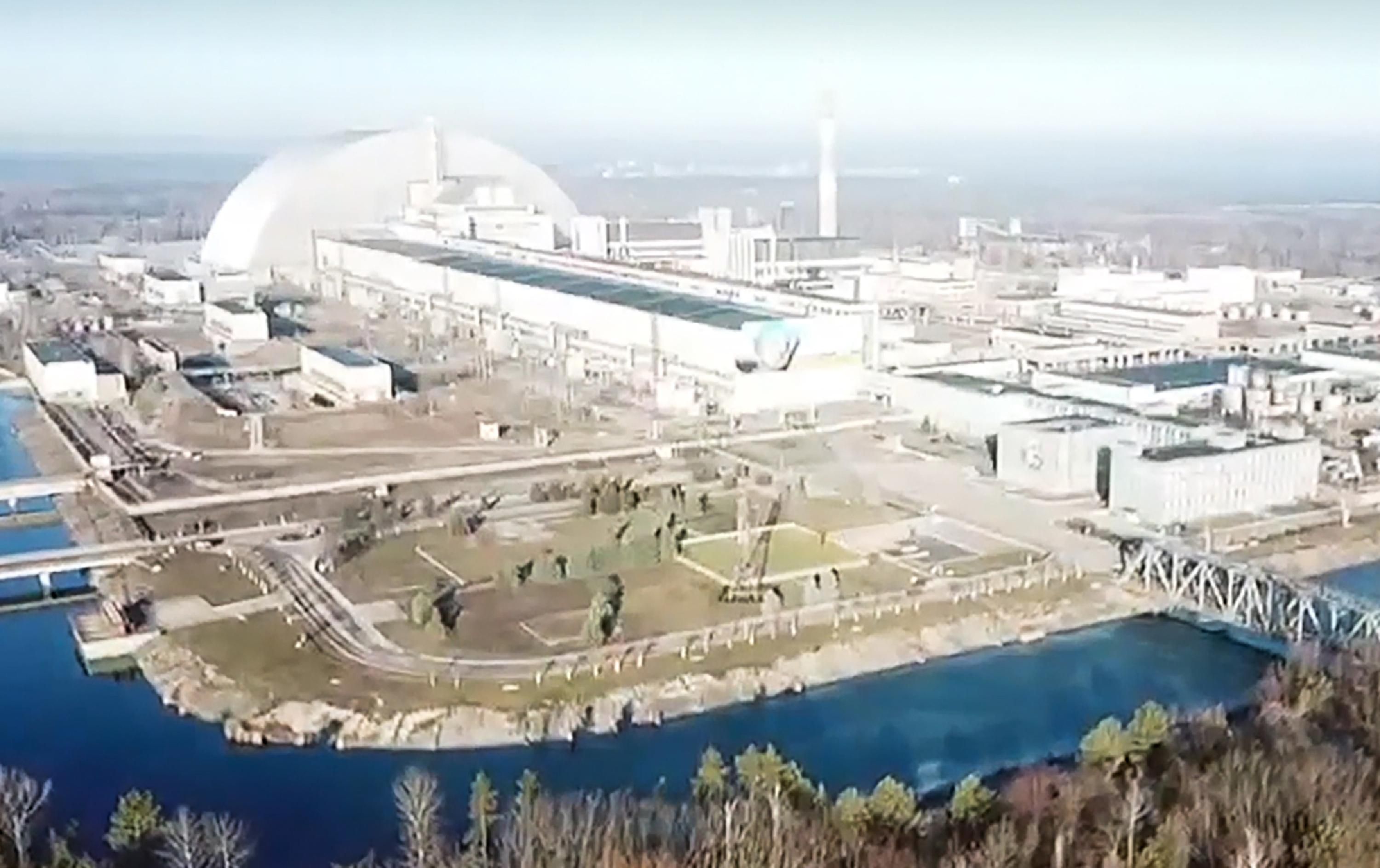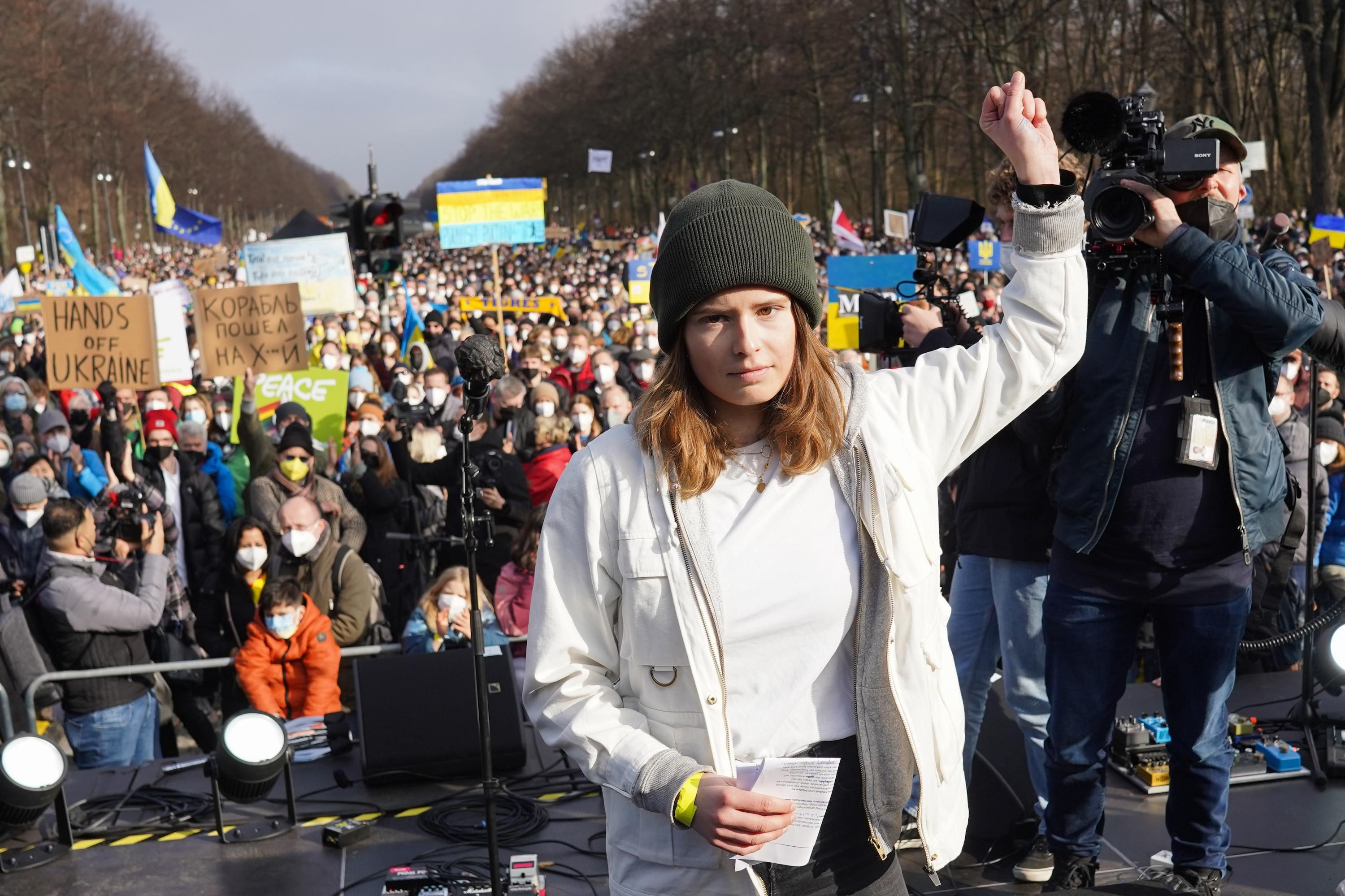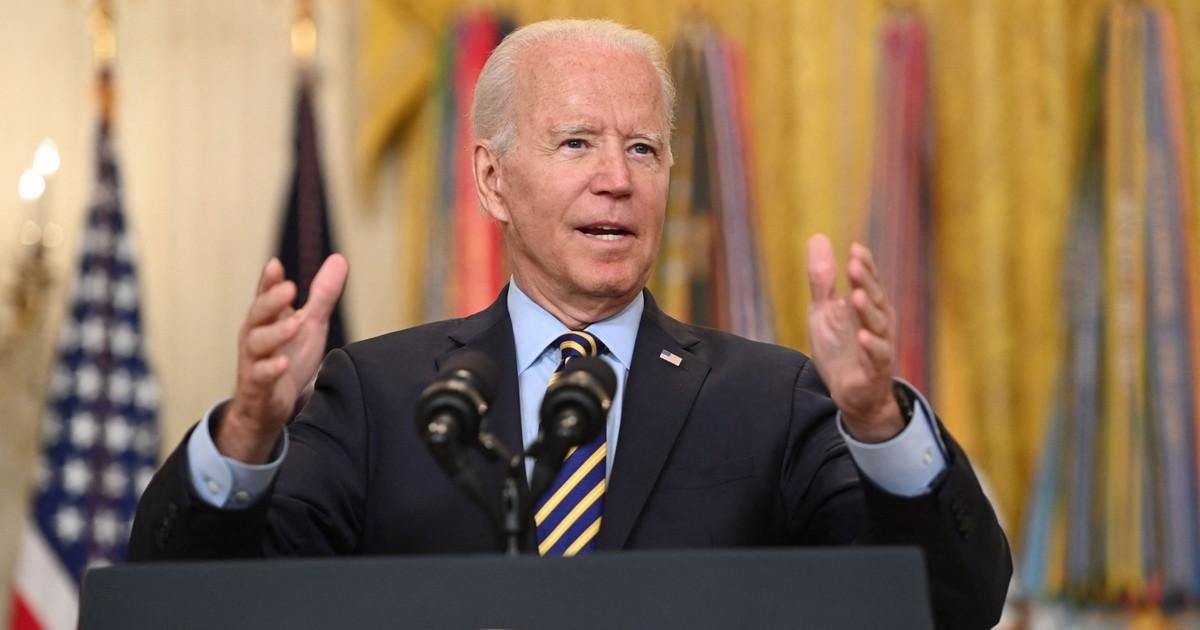Russia's assault on Ukraine risks nuclear devastation "far worse even than the Fukushima Daiichi catastrophe of 2011," Greenpeace warns.

Pictured in this video screengrab is the Chernobyl Nuclear Power Plant on February 26, 2022 in Pripyat, Ukraine (Photo: Russian Defence Ministry/TASS via Getty Images)
JAKE JOHNSON
The international environmental group Greenpeace warned Wednesday that Russia's intensifying assault is placing Ukraine's nuclear power facilities under serious threat, risking devastation "far worse even than the Fukushima Daiichi catastrophe of 2011."
"For the first time in history, a major war is being waged in a country with multiple nuclear reactors and thousands of tons of highly radioactive spent fuel."
In a 12-page analysis, Greenpeace details the unique hazards posed by Russia's war on Ukraine, which maintains 15 nuclear power reactors and is home to the largest nuclear energy complex in Europe. That facility, known as the Zaporizhzhia Nuclear Power Plant, is currently surrounded by Russian troops looking to force their way through a makeshift blockade erected Wednesday by ordinary Ukrainians.
Greenpeace's new brief argues that the Zaporizhzhia plant is especially vulnerable to an accident or attack stemming from Russia's invasion, which entered its seventh day on Wednesday with no end in sight.
Authored by a pair of Greenpeace nuclear specialists, the risk analysis notes that "there have been multiple safety issues with the Zaporizhzhia reactors over the decades, not least that these reactors are aging having been designed and built in the 1970s to the 1990s."
Greenpeace raises particular concern over the complex's susceptibility to electrical power outages, its storage of spent nuclear fuel, and risks posed by flooding given the facility's close proximity to the massive Dnipro river system. Severe damage to the plant, the group warns, could "render vast areas of the European continent, including Russia, uninhabitable for decades."
In the case of the 2011 Fukushima disaster—during which three nuclear reactors melted down and released radioactive plumes following an earthquake-induced tsunami—the Japanese facility's spent nuclear fuel did not catch fire, a near miss that scientists have said should serve as a "wake-up call" for other countries.
Greenpeace's report raises the ominous possibility that catastrophe may not be averted if the Zaporizhzhia facility is damaged in the course of Russia's assault on Ukraine, either from an accident or an intentional bombing:
The amount of spent fuel in each of the pools at the six Zaporizhzhia reactors ranges from 132 to 157 tons as of 2017, and in total 855 tons of spent fuel are in the six pools. This is the latest publicly available data we have access to. It is not possible without precise data to say what the radiological inventory is of this spent fuel, however, in our review of the scientific and technical literature of the past two decades it appears that the average fuel burn-up of the nuclear fuel used over the last 20 years at Zaporizhzhia is 44-49GWd/tHM. This is comparable, and perhaps higher, than the nuclear fuel in the pools at Fukushima Daiichi.
In the event of a loss of cooling and resultant fire in any of the spent fuel pools at Zaporizhzhia, the potential for a very large release of radioactivity would have a devastating effect not only on Ukraine but also its neighboring countries, including Russia, and potentially, depending on the weather conditions and wind directions, on a large part of Europe. Again, it should be stressed that in the event of such a catastrophic incident, the entire power plant might have to be evacuated and a cascade of similar accidents at the other five pools as well as the six reactors might take place.
To prevent such a nightmare scenario from becoming reality, Greenpeace said Russia must end its war on Ukraine.
"So long as this war continues, the military threat to Ukraine's nuclear plants will remain. This is one further reason, amongst so many, why Putin needs to immediately cease his war on Ukraine," Jan Vande Putte, a radiation protection adviser and nuclear campaigner for Greenpeace East Asia and Greenpeace Belgium, said in a statement Wednesday.
"For the first time in history, a major war is being waged in a country with multiple nuclear reactors and thousands of tons of highly radioactive spent fuel," he continued. "The war in southern Ukraine around Zaporizhzhia puts them all at heightened risk of a severe accident."
Our work is licensed under Creative Commons (CC BY-NC-ND 3.0). Feel free to republish and share widely.
"More unbelievable bravery from everyday Ukrainian citizens," responded one journalist.

Video footage shows Ukrainian residents gathered in a street near the Zaporizhzhia Nuclear Power Plant on March 2, 2022.
JAKE JOHNSON
Video footage from the ground Wednesday showed Russian forces firing on ordinary Ukrainians who were blocking a road with their bodies and makeshift barricades in the town of Enerhodar in an effort to prevent Russian troops from advancing on the Zaporizhzhia Nuclear Power Plant, the largest nuclear power facility in all of Europe.
Earlier footage posted on social media and circulated by news outlets showed hundreds of residents and plant employees rallying in the street in the eastern Ukraine town in a show of defiance as Russian troops reportedly seized control of the territory surrounding the Zaporizhzhia complex, which contains six of Ukraine's 15 nuclear energy reactors.
"More unbelievable bravery from everyday Ukrainian citizens," journalist Kyle Glen wrote on Twitter. "The road into the town of Energodar, which contains Europe's largest nuclear power plant, is blocked by vehicles and people."
As The Daily Beast reported Tuesday, "A video posted to TikTok shows a crowd of civilians armed only with a few Ukrainian flags go after a Russian vehicle invading their town."
"A caption on the video claims it was recorded in Kupyansk, in Kharkiv oblast in the northeast of the country, although the location could not be verified," the outlet noted. "What is clear from the extraordinary footage is that a group of five Ukrainians spot a Russian SUV attempting to drive down their street and they race to block it off. The vehicle is forced to slow down and around 20 men and women, some carrying Ukrainian flags, risk their lives by swarming around the vehicle. One man climbs onto the hood and attempts to kick out the windshield before the Russians make a hasty exit."
Other video clips posted to social media show Ukrainian residents trying to slow the advance of Russian tanks:
The Ukrainian effort to blockade Zaporizhzhia came amid growing concerns of nuclear disaster as Russia continues to ramp up its deadly bombing campaign, potentially putting Ukraine's nuclear reactors in the line of fire.
Last week, as Common Dreams reported, the Ukrainian government warned that radiation near the defunct Chernobyl nuclear power plant "exceeded" control levels.
In a statement Wednesday, the head of the International Atomic Energy Agency (IAEA) said that "any military or other action that could threaten the safety or security of Ukraine's nuclear power plants must be avoided."
"Operating staff must be able to fulfill their safety and security duties and have the capacity to make decisions free of undue pressure," said IAEA Director-General Rafael Mariano Grossi. "The IAEA continues to closely monitor developments in Ukraine, with a special focus on the safety and security of its nuclear power reactors."
Our work is licensed under Creative Commons (CC BY-NC-ND 3.0). Feel free to republish and share widely.
Jay Bennett
Wed, March 2, 2022,

Photo credit: FPG - Getty Images
The “Little Boy” and “Fat Man” atomic bombs dropped on Hiroshima and Nagasaki at the end of World War II are the only nuclear weapons used in warfare ... so far.
But that could soon change—in a February address to Moscow, Russian President Vladimir Putin provided a thinly veiled threat of nuclear warfare against the West.
The atomic bombs dropped on the Japanese cities Hiroshima and Nagasaki at the end of World War II—codenamed “Little Boy” and “Fat Man,” respectively—caused widespread destruction, leveled cities, and killed between 90,000 and 166,000 people in Hiroshima (about 20,000 of which were soldiers), and between 39,000 and 80,000 in Nagasaki.
These are the only two nuclear weapons ever used in warfare, to date, and let’s hope it stays that way—because some of the nuclear weapons today are over 3,000 times as powerful as the bomb dropped on Hiroshima.
And there are new fears, stoked by the ongoing Russo-Ukrainian War, that Russian President Vladimir Putin could deploy nuclear weapons against the West.
During a February 24 address to Moscow, Putin warned other countries that any attempt to intervene would lead to “consequences you have never seen,” which has been interpreted as a veiled threat of nuclear warfare.
Let's return to the history of atomic weapons. The Little Boy and the Fat Man were atomic bombs, or fission bombs, which set off a chain reaction of nuclear fission. The atomic nuclei of radioactive materials were split to create different elements, which releases a large amount of energy, splitting more atoms as a result and producing a destructive explosion.
In the Little Boy, a bullet-like projectile made of uranium-235 was fired at a core of the same substance to set off the chain reaction. The Fat Man, on the other hand, used a core of plutonium-239 that was ignited with thousands of pounds of conventional explosives, again setting off a chain reaction of nuclear fission.
In a thermonuclear weapon, often called a hydrogen bomb, the fission process is only the beginning. Modern nuclear weapons, such as the United States’ B83 bombs, use a similar fission process to what is used in atomic bombs. But that initial energy then ignites a fusion reaction in a secondary core of the hydrogen isotopes deuterium and tritium. The nuclei of the hydrogen atoms fuse together to form helium, and again a chain reaction results in an explosion—this time a much more powerful one.
As the above video from YouTube channel RealLifeLore illustrates, the blast from the Little Boy released about 15 kilotons of energy, equivalent to 15,000 tons of TNT, and sent a mushroom cloud up to about 25,000 feet. The Fat Man produced an explosion of about 21 kilotons. The B83? 1.2 megatons, equaling 1,200,000 tons of TNT, making it 80 times more powerful than the Little Boy.
It gets even more terrifying than that. The largest nuclear weapon ever detonated, the Tsar Bomba, set off by the Soviet Union in 1961, produced an insane 50-megaton blast—about 3,333 times more powerful than the Little Boy bomb that leveled an entire city. The Tsar Bomba is the largest manmade explosion to date, sending a mushroom cloud up to more than 130,000 feet in altitude—about 4.5 times the height of Mount Everest—as it sent shockwaves around the globe three times over.
Curious to see how you’d fare in the event that a nuclear bomb were dropped on a big city near you? NUKEMAP, created by Alex Wellerstein, charts out the impacts of a nuclear blast on cities around the world. (It also maps out the waste laid by historic nuclear blasts such as the Trinity blast in New Mexico in 1945, and that 1961 Tsar Bomba blast in Novaya Zemlya, Russia.)
If we wanted to, we could build a bomb even more powerful than the Tsar Bomba. But maybe it’s time we start looking to use nuclear fusion for something else. How about a six-month round-trip to Mars instead?









